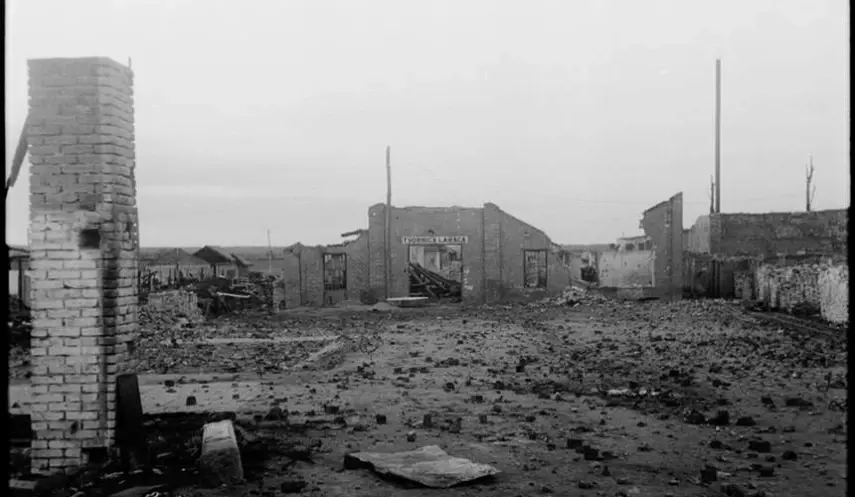RUN! WE WILL DIE ANYWAY!
Region - NDH - crimes /7/
04/28/2025
10:45

BANJA LUKA, APRIL 26 /SRNA/ - Ilija Ivanović, who as a 16-year-old boy managed to survive the breakthrough of the Jasenovac concentration camp, pointed out in his book "Witness to Jasenovac's Hell," that in early April, the Ustashas began mass destruction of evidence, demolishing part of the camp, burning the bones of victims and documentation in order to cover the atrocities.
The portal srpskanational.com publishes excerpts from the book, testimonies about the events of April 21 and 22, 1945:
The dawn brakes. Explosions can be heard from the direction of Jasenovac village. In the dawn, we had something to see. Our labor camp, from where we were driven yesterday, was all in ruins. The Ustashas had razed everything to the ground in order to cover up their atrocities.
In the fall of 1944 and spring of 1945, they dug up mass graves and burned the bones of the victims, and now they are making a last-ditch effort to destroy evidence of the atrocities they committed. It is clear to us that they are retreating, and that is why they are demolishing. Everything. We are still imprisoned in this building. We, the last prisoners of the camp who must be liquidated before the final retreat.
It's dawn. There's a commotion in the building. Here and there, groups of people are discussing something. I'm hungry. I wander around, approach a larger group of people, and make my way to the center, thinking that someone is eating something there.
Someone hanged themselves in the toilet, the inmates shouted. I ran there. I was gripped by a sense of dread. I hadn't seen Dušan Prpoš, my comrade, since last night. I suspected the worst. And indeed, as soon as I reached the toilet, I saw Dušan hanging from a long-prepared rope that he had tied to the water tank.
He was afraid the rope wouldn't hold his weight. Unfortunately, it did. A lot of us gathered in front of the toilet. No one even tried to lower him to the floor. No point. Tears wet my eyes and cheeks. I felt guilty. I shouldn't have left him alone. Maybe I could have influenced him not to do it. But it's over now.
The boy's lifeless body no longer feels anything. The psychological trauma was stronger than him. He couldn't stand it. He killed himself, an hour or two before the fateful events.
I returned dejected to the master and told him what had happened. "Be quiet, don't be sad, maybe he did the right thing," the master told me. I look out the window, the rain is pouring down like a torrent. There is a thunderstorm, it's as if the sky has opened up and wants to swallow us. The master is lying on a blanket.
Suddenly there was thunder, but now in the exit corridor of our building. The shouts of the people merged with the thunder of the sky. I ran to see what was happening. In the corridor, a hundred people were breaking down the exit door with the pressure of their bodies. Fists raised. In some hands, pieces of brick, in one, an axe, probably found somewhere in the attic. I heard shouts: Hurray, forward comrades, freedom or death!
The door opened. They broke. People ran out like an avalanche. They ran over the Ustasha guard. Hell. The Ustashas opened fire from all the surrounding bunkers. The windows were breaking. Bullets were whizzing over our heads. The rain was still pouring. I turned back to the master for a moment /he was a good man, I liked him/ and shouted: "Let's run, master!"
"No, son," he replied. I shouted again: "Let's run!" He just said: "No, my son. On my, what have they done! Now we are all going to get killed." I told him that we will die anyway and that we should run. He just shouted: "No, son!"
"Master, I have listened to you until now, but from now on I will not! I am leaving. Goodbye!" I rushed towards the exit. The master's last words, which reached my ears through the thunder and the roar of the cannons, were: "Goodbye, son! Good luck! Don't forget..."
What should I not forget, I didn't hear.
Tags

CONDUCT UPCOMING ELECTIONS IN ACCORDANCE WITH THE REPUBLIKA SRPSKA ELECTORAL LAW

SERBS IN TEARS AND FEAR OVER OWNERSHIP OF ORTHODOX CEMETERIES AND CHURCHES

CVIJANOVIĆ DEMANDS ACCOUNTABILITY FOR SHAMEFUL CONCERT IN ŠIROKI BRIJEG





